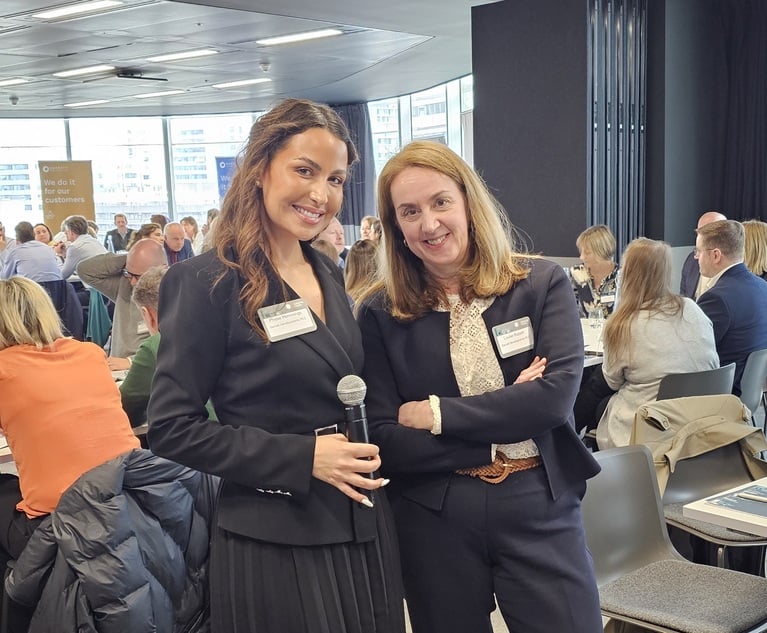Hanging on the telephone
Last year was not good for Sony Ericsson. The troubled mobile phone manufacturer found itself recording a $1.1bn (£730m) loss as the recession saw handset sales plummet and competitor products, such as Apple's iPhone, dominate what was left of the market. During the last 18 months the company has cut over 2,000 jobs, including 10 in its legal department. "Although I am very confident about our future, we're very much in protect and survive mode at the moment," admits Sony Ericsson general counsel and company secretary Jonathan Pearl.
March 10, 2010 at 07:04 PM
5 minute read
Sony Ericsson GC Jonathan Pearl tells Alex Aldridge why he gets a buzz out of working in business and why he learned to delegate
Last year was not good for Sony Ericsson. The troubled mobile phone manufacturer found itself recording a $1.1bn (£730m) loss as the recession saw handset sales plummet and competitor products, such as Apple's iPhone, dominate what was left of the market. During the last 18 months the company has cut over 2,000 jobs, including 10 in its legal department. "Although I am very confident about our future, we're very much in protect and survive mode at the moment," admits Sony Ericsson general counsel and company secretary Jonathan Pearl.
And he thinks 2010 will be tough, too: "While I don't expect to lose people this year, I do expect a lot of scrutiny on our costs and efficiency – although the legal budget should remain at its current figure."
A large proportion of the €26m-€27m (£23.5m-£24.4m) Sony is expecting to spend this year on outside counsel goes on defending patent litigation cases in the US – an unavoidable hazard of developing new products in a heavily trademarked industry. Pearl has succeeded in trimming costs in this area by breaking up the work and sending more commoditised tasks to smaller law firms. He comments: "It makes sense to have the heavy lifting done as cost-efficiently as possible."
He has also been pushing hard for value-based billing agreements among Sony Ericsson's regular legal advisers, the majority of which are firms in the US, including K&L Gates and Paul Hastings Janofsky & Walker. Baker & McKenzie and Eversheds are the outfits most regularly instructed in the UK. However, Pearl concedes that where the litigation approaches a 'bet the company' level of seriousness, it becomes near-impossible to work with law firms on anything other than an hourly rate. "For the really major stuff, it would be bonkers to choose the second-rate firm that is offering to charge per job in favour of the top firm that is insisting on billing by the hour," he adds.
At the same time, Pearl has been ensuring that things run as tightly as possible internally – hence his decision to bring in Paul Gilbert of LBC Wise Counsel, the in-house lawyer consultancy, who will start work with the Sony Ericsson legal team in the coming months. "While we're already pretty efficient, doing much of the legal work generated by the company ourselves, there is always room for improvement," Pearl says. "Getting a view from outside should help us do this."
You get the impression that Pearl would make a pretty good consultant himself. Management is particularly important to him. It is why he left private practice: "I realised fairly early on into my time at Bates Wells & Braithwaite that life at a law firm wasn't for me; I value legal skills but I wanted to be involved in business, working with people." And it is why he joined Sony from his first in-house position at Apple: "Apple was exciting and had a fantastic atmosphere, but I wanted to manage people, and the opportunity came up at Sony to head up a small team," he comments.
At first, though, management proved more difficult than he thought: "You think managing people will be easy if you're a nice guy. But actually it's probably harder that way, certainly tougher than I expected." But through a philosophy of honesty and "refusing to react when buttons are being pushed that affect your ego", he has now got it down to a point where he is so trusting of those working under him that he is happy to admit to "knowing no law anymore". He continues: "I just know people who know things – and let them get on with doing what they're good at. At the end of the day, I can't do their jobs half as well as they can."
Such an approach is essential for Pearl to keep track of the bigger picture affecting his 67-strong legal team, based in London, Lund, Munich, Singapore, Beijing, Tokyo and at various locations in the US. Overseeing them means a gruelling schedule of travel that sees Pearl on the road three weeks out of every four. "I'm so used to being jet-lagged that's it's almost become the norm. But it's worth it – you can't manage people via teleconference," he says.
Pearl's twin role as company secretary, which sees him involved in board-level discussions between parent companies Sony and Ericsson, also demands a fair amount of his attention. "One of the reasons why the joint venture [founded in 2001] has been so successful and long-lasting is that it is based on quite a thin agreement, meaning there's a lot of dialogue between the two parents about how to get the best out of it," he says, adding that this is probably the aspect of the job he finds most interesting. "It's fascinating to be around amazing business people like Howard Stringer, chairman and CEO of Sony, and Ericsson CEO Hans Vestberg," he continues. "You never know which directions these discussions are going to go in."
Currently Sony Ericsson is building its comeback on a greater push in the US, the world's most lucrative mobile phone market, where it has never been a major player. From his position within the company's inner circle, Pearl is readying his team to play a supporting role.
Career timeline
1985: Graduates from Warwick University
1988: Joins Bates Wells & Braithwaite as a trainee
1990: Moves to Apple UK as legal counsel
1993: Joins Sony Electronics Europe as chief counsel
2005: Becomes general counsel and company secretary for Sony Ericsson
This content has been archived. It is available through our partners, LexisNexis® and Bloomberg Law.
To view this content, please continue to their sites.
Not a Lexis Subscriber?
Subscribe Now
Not a Bloomberg Law Subscriber?
Subscribe Now
NOT FOR REPRINT
© 2024 ALM Global, LLC, All Rights Reserved. Request academic re-use from www.copyright.com. All other uses, submit a request to [email protected]. For more information visit Asset & Logo Licensing.
You Might Like
View All
'I Won’t Name the Firm, But...'—Barratt Redrow's Legal Head on External Counsel Red Flags

Setting Standards: Vanguard Australia's Sean Hughes on Moving From Government Regulator to Corporate General Counsel
6 minute read
Netflix Offices Raided by Authorities in Paris and Amsterdam
Trending Stories
Who Got The Work
Michael G. Bongiorno, Andrew Scott Dulberg and Elizabeth E. Driscoll from Wilmer Cutler Pickering Hale and Dorr have stepped in to represent Symbotic Inc., an A.I.-enabled technology platform that focuses on increasing supply chain efficiency, and other defendants in a pending shareholder derivative lawsuit. The case, filed Oct. 2 in Massachusetts District Court by the Brown Law Firm on behalf of Stephen Austen, accuses certain officers and directors of misleading investors in regard to Symbotic's potential for margin growth by failing to disclose that the company was not equipped to timely deploy its systems or manage expenses through project delays. The case, assigned to U.S. District Judge Nathaniel M. Gorton, is 1:24-cv-12522, Austen v. Cohen et al.
Who Got The Work
Edmund Polubinski and Marie Killmond of Davis Polk & Wardwell have entered appearances for data platform software development company MongoDB and other defendants in a pending shareholder derivative lawsuit. The action, filed Oct. 7 in New York Southern District Court by the Brown Law Firm, accuses the company's directors and/or officers of falsely expressing confidence in the company’s restructuring of its sales incentive plan and downplaying the severity of decreases in its upfront commitments. The case is 1:24-cv-07594, Roy v. Ittycheria et al.
Who Got The Work
Amy O. Bruchs and Kurt F. Ellison of Michael Best & Friedrich have entered appearances for Epic Systems Corp. in a pending employment discrimination lawsuit. The suit was filed Sept. 7 in Wisconsin Western District Court by Levine Eisberner LLC and Siri & Glimstad on behalf of a project manager who claims that he was wrongfully terminated after applying for a religious exemption to the defendant's COVID-19 vaccine mandate. The case, assigned to U.S. Magistrate Judge Anita Marie Boor, is 3:24-cv-00630, Secker, Nathan v. Epic Systems Corporation.
Who Got The Work
David X. Sullivan, Thomas J. Finn and Gregory A. Hall from McCarter & English have entered appearances for Sunrun Installation Services in a pending civil rights lawsuit. The complaint was filed Sept. 4 in Connecticut District Court by attorney Robert M. Berke on behalf of former employee George Edward Steins, who was arrested and charged with employing an unregistered home improvement salesperson. The complaint alleges that had Sunrun informed the Connecticut Department of Consumer Protection that the plaintiff's employment had ended in 2017 and that he no longer held Sunrun's home improvement contractor license, he would not have been hit with charges, which were dismissed in May 2024. The case, assigned to U.S. District Judge Jeffrey A. Meyer, is 3:24-cv-01423, Steins v. Sunrun, Inc. et al.
Who Got The Work
Greenberg Traurig shareholder Joshua L. Raskin has entered an appearance for boohoo.com UK Ltd. in a pending patent infringement lawsuit. The suit, filed Sept. 3 in Texas Eastern District Court by Rozier Hardt McDonough on behalf of Alto Dynamics, asserts five patents related to an online shopping platform. The case, assigned to U.S. District Judge Rodney Gilstrap, is 2:24-cv-00719, Alto Dynamics, LLC v. boohoo.com UK Limited.
Featured Firms
Law Offices of Gary Martin Hays & Associates, P.C.
(470) 294-1674
Law Offices of Mark E. Salomone
(857) 444-6468
Smith & Hassler
(713) 739-1250










